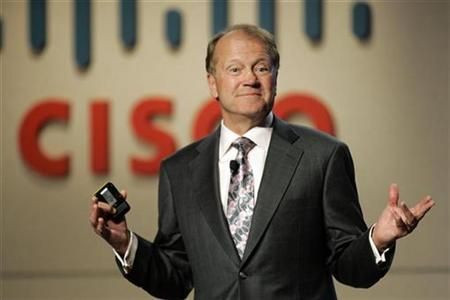Cisco 1Q Results Likely Latest Tech Bellwether

When Cisco Systems Inc. (Nasdaq: CSCO) reports first-quarter results Tuesday, investors will likely be wondering if it's signalling another quarter of slower-than-expected growth.
The San Jose, Calif., company, the No. 1 developer of Internet routers and switches and software is a technology bellwether. On Thursday, Dell Inc. (Nasdaq: DELL), now the No. 2 global PC maker is scheduled to report third-quarter results.
Next up will be Hewlett-Packard Co. (NYSE: HPQ), now the No. 2 PC maker and No. 1 computer company, which reports next week. CEO Margaret Whitman has already telegraphed the Palo Alto, Calif., company faces tough competition.
These three tech giants, because they report results outside the usual cycle, shed clues on the overall sector. For the past two years, they've been buffetted by slower orders from Europe, high value of the dollar that dampens foreign sales and Chinese competition.
Cisco is expected to report mildly improved results over last year, with earnings of 46 cents a share on revenue of $11.8 billion, compared with 43 cents on revenue of $11.3 billion, according to analysts surveyed by Thomson Reuters.
Overall demand for Internet products isn't as robust as it should be, with various analysts suggesting Cisco will benefit now from some of its other forays into media conferencing, televideo and cloud computing.
In the last category, Citrix recently signed a deal with network software provider Citrix Systems (Nasdaq: CTXS).
As well, CEO John Chambers, 63, one of the most beloved and respected Silicon Valley executives, appointed his latest heir apparent in the quarter, Gary Moore, also 63. He was appointed president last month. Moore formerly worked at Hitachi Data Systems and EDS, now part of HP, before joining Cisco as a senior VP in 2001.
Several prior heirs apparent have departed when it looked as if Chambers wasn't about to step down. At International Business Machines Corp. (NYSE: IBM) the customer is for the CEO to retire at 60, as Sam Palmisano did as well as his predecessor, Louis V. Gertsner, Jr.
George Notter, analyst with Jefferies, said Cisco's results may beat the predicted estimates by Chambers because they were conservative. But demand for network products by large companies last month wasn't great.
As well, government agency orders may be deferred until the U.S. government settles the current budget crisis, Notter warned. He maintained a “hold” rating on Cisco shares, with a target price of $18.
At Stifel Nicolaus, analyst Sanjay Wadwani warned a “slowdown” in the U.S. over the past two months may harm Cisco. He maintains a “buy” rating with target of 23 on the shares.
He said demand for products in corporate data centers remains strong, as has been the experience for Cisco the past several quarters. That's largely because many enterprises are beefing up to handle cloud computing and dealing with the proliferation of devices like smartphones and tablets that cry out for network capability.
S&P's J. Moorman, who has a “buy” rating on Cisco with a target price of $23, notes the company has been doing its best to retain its 60 percent market share. As well, with cash and investments exceeding $48.7 billion last quarter, Cisco might easily boost its dividend, which it started to pay only last year.
The current Cisco dividend is 14 cents a share, announced only in mid-August, which was 75 percent above the initial 6 cents set in 2011.
Shares of Cisco fell a penny to $16.84 in Tuesday afternoon trading, bringing the company's market capitalization to $87.7 billion, a far cry from the boom years when it was the world's most valuable company.
Cisco shares have fallen nearly 7 percent this year and dipped 11.4 percent over the past 52 weeks.
© Copyright IBTimes 2025. All rights reserved.






















